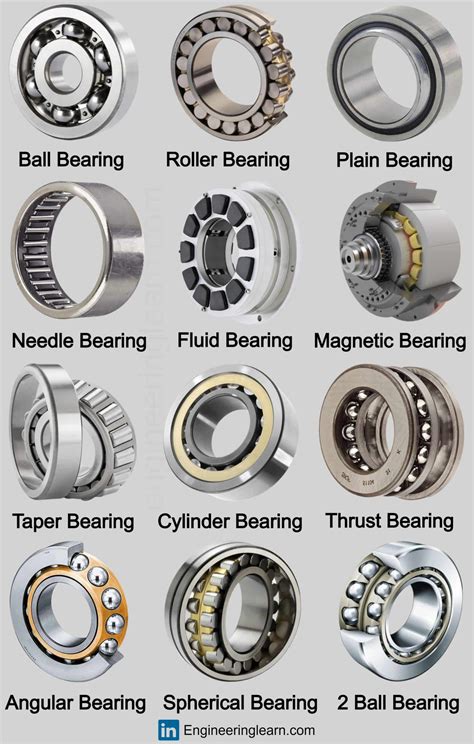Bearings: The Foundation of Smooth and Efficient Motion
Introduction
Bearings are essential components in various applications, from everyday devices like ceiling fans to sophisticated machinery in industries. They enable smooth and efficient rotation by reducing friction between moving parts. Understanding the types, applications, and importance of bearings is crucial for engineers, technicians, and anyone involved in machine design and operation.
Types of Bearings

-
Ball Bearings: Consist of small, spherical balls rolling between inner and outer races. They are compact, easy to maintain, and suitable for high-speed applications.
-
Roller Bearings: Use cylindrical or tapered rollers instead of balls. They can handle heavier loads and are commonly found in automotive and industrial machinery.
-
Thrust Bearings: Designed to handle loads perpendicular to the shaft. They are used in applications such as vertical pumps and wind turbines.
-
Linear Bearings: Facilitate linear motion instead of rotary motion. They are crucial in robotics, automation, and medical devices.
-
Sleeve Bearings: The simplest type, consisting of a cylindrical shaft rotating within a cylindrical bearing surface. They are commonly used in low-load and low-speed applications.
Applications of Bearings
Bearings are indispensable in numerous industries, including:
-
Automotive: Engine, transmission, and wheel systems
-
Aerospace: Aircraft engines and landing gear
-
Industrial: Pumps, compressors, and turbines
-
Medical: Surgical instruments and imaging equipment
-
Consumer Products: Appliances, toys, and power tools
Importance of Bearings

-
Reduce Friction: Bearings minimize energy loss due to friction, improving efficiency and extending equipment life.
-
Provide Precision: High-quality bearings ensure accurate and consistent motion, critical in applications such as machine tools and medical devices.
-
Handle Heavy Loads: Bearings can withstand substantial loads, enabling equipment to operate under demanding conditions.
-
Extend Equipment Life: By reducing friction and wear, bearings increase the longevity of machinery, minimizing downtime and maintenance costs.
The Bearing Industry
The global bearing market is valued at over $220 billion and is projected to grow significantly in the coming years. Factors driving growth include increasing demand from industries such as automotive, aerospace, and renewable energy. Leading manufacturers include SKF, Timken, NSK, and Schaeffler.
Common Mistakes to Avoid
-
Overloading Bearings: Exceeding the rated load capacity of bearings can lead to premature failure.
-
Incorrect Lubrication: Using the wrong lubricant or insufficient lubrication can damage bearings and reduce their lifespan.
-
Improper Installation: Failure to properly install bearings can cause alignment issues and accelerate wear.
-
Neglecting Maintenance: Regularly scheduled maintenance, including cleaning, lubrication, and inspections, is essential for ensuring bearing longevity.
Why Bearings Matter
-
Improved Efficiency: Reduced friction enhances energy efficiency and lowers operating costs.
-
Increased Reliability: Reliable bearings minimize downtime and production losses associated with equipment failure.
-
Enhanced Precision: Precise bearings enable accurate and repeatable motion, critical in many manufacturing and scientific applications.
-
Extended Equipment Life: Proper bearing maintenance extends the lifespan of machinery, reducing capital expenditure and maintenance costs.
-
Reduced Noise and Vibration: High-quality bearings operate quietly and minimize vibrations, improving operator comfort and working environments.
Benefits of Using High-Quality Bearings
-
Increased Productivity: Reliable bearings minimize downtime, resulting in higher productivity and output.
-
Reduced Maintenance Costs: Fewer bearing failures and longer lifespan reduce the frequency and cost of maintenance interventions.
-
Improved Safety: Well-maintained bearings minimize the risk of catastrophic equipment failures, improving safety for operators and the environment.
-
Enhanced Product Quality: Bearings contribute to the smooth and precise operation of machinery, leading to higher quality products.
-
Environmental Sustainability: Energy-efficient bearings reduce energy consumption and minimize carbon footprint.
Comparison of Bearing Types
| Feature |
Ball Bearings |
Roller Bearings |
Thrust Bearings |
Linear Bearings |
Sleeve Bearings |
| Load Capacity |
Moderate |
High |
Axial |
Moderate |
Low |
| Speed |
High |
High to Medium |
Low to Medium |
Low |
Medium |
| Friction |
Low |
Moderate |
High |
Very Low |
High |
| Noise |
Low |
Moderate |
High |
Low |
High |
| Cost |
Moderate |
High |
High |
Moderate |
Low |
| Maintenance |
Easy |
Moderate |
Moderate |
Easy |
Low |
Stories
Story 1:
A manufacturing plant experienced excessive downtime due to repeated failures of roller bearings in their production machinery. After an investigation, it was discovered that the bearings were being overloaded due to incorrect machine setup. By adjusting the machine's settings and using bearings with a higher load capacity, the plant significantly reduced downtime and increased production efficiency.
Lesson Learned: Correctly selecting bearings for the application and ensuring proper installation is crucial for optimal performance and longevity.
Story 2:

A hospital reported excessive noise and vibration from its surgical instruments, which interfered with delicate procedures. Upon inspecting the instruments, it was found that the ball bearings in the handpieces were worn and not properly lubricated. Replacing the bearings with high-quality, low-noise models significantly reduced noise and vibration, improving surgical precision and patient comfort.
Lesson Learned: Regular maintenance and using high-quality bearings are essential for ensuring smooth and quiet operation of precision equipment.
Story 3:
A wind turbine operator faced frequent downtime due to premature failures of thrust bearings in the turbine's gearbox. An analysis revealed that the bearings were not adequately protected from the harsh environmental conditions. By installing improved seals and using bearings with corrosion-resistant materials, the operator extended the lifespan of the bearings and reduced downtime, resulting in increased energy production and revenue.
Lesson Learned: Protecting bearings from external factors such as moisture, dust, and extreme temperatures is crucial for ensuring reliability and extending their service life.
Conclusion
Bearings play a pivotal role in enabling smooth, efficient, and precise motion in countless applications across industries. Understanding the different types, applications, and importance of bearings empowers engineers, technicians, and users to select and maintain bearings optimally. By avoiding common mistakes, utilizing high-quality bearings, and implementing proper maintenance practices, businesses can enhance productivity, reduce maintenance costs, and ensure the safe and reliable operation of their machinery.
